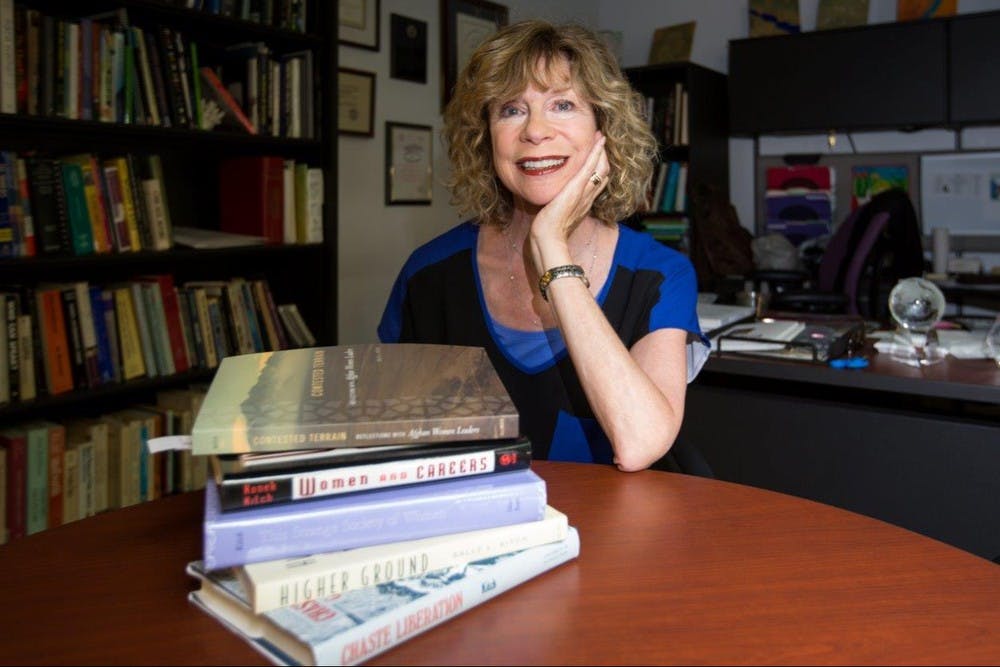While professors involved in STEM fields tend to gain more clout while other academics are pushed to the shadows, a woman long at the forefront of women’s and gender studies, Sally Kitch, has made her way into the limelight.
ASU Interim Provost Mark Searle named Kitch an exclusive title, "University Professor," on Sept. 24.
This designation is given to very few individuals to recognize them for their exceptional academic performance in teaching, research and intellectual leadership within the University, and they are nominated by the deans of their respective schools.
Kitch’s work in women’s and gender studies focuses on feminist theory, which deals with people’s concept and perception of women in society. Kitch said she was interested in theoretical applications more than the women’s rights movement known as feminism.
“I’m more interested in the conceptual aspects of it,” Kitch said. “How people think about women, how people think about gender ... the kind of cultural constructs that shape the gendered aspects of people’s lives.”
Kitch expressed a profound need for the feminist movement, in all its many forms, in a society that is still struggling to achieve equality.
“One thing I can say is that the need for attention to women’s rights and women's equal treatment in society and the perception of women has never been greater than it is right now,” she said.
Kitch has explored feminist theory in seven books covering a vast array of topics that deal with gender roles and cultural theory.
Kitch also pioneered the sub-field of feminist theory that studies the interaction between feminism and utopian and dystopian societies.
“I became interested in the idea of what a society might do if it was designing itself from scratch, what it might do in terms of women's rights and women's equality with men,” she said.
Kitch said this led her to study 19th century utopian communities and the roles that women played, and ultimately convinced her that utopianism is not in the best interest of feminism or society.
“What I’m suggesting is that we need to get away from the idea of creating specific community designs ... and using the idea of utopia as a framework for thinking of possibilities without foreclosing opportunities,” she said. “Humans are very bad at planning the future. This failing of ours means we have to have a cautionary principle in terms of our planning.”
This kind of forward thinking is characteristic of Kitch, who has been apart of the rising field of women and gender studies since its conception and received her doctorate from Emory University, the first university to issue doctorates in women’s studies.
Kitch is the founding director of the Institute for Humanities Research, a regents professor of women’s and gender studies at the School of Social Transformation in the College of Liberal Arts and Sciences and a sustainability scientist at the Julie Ann Wrigley Global Institute of Sustainability at ASU.
Currently, Kitch is also working as the principal investigator on an Andrew W. Mellon Foundation grant study about environmental sustainability and its impacts on social justice issues.
Mary Margaret Fonow, a long time colleague of Kitch’s in the field of women and gender studies, said Kitch has been instrumental in the growth and development of the field.
“I can tell you she’s important in our field,” Fonow said. “She’s very well known in women's gender studies and in humanities.”
Head of faculty for women’s and gender studies at the School of Social Transformation Lisa M. Anderson also said Kitch has been on the cutting edge of the field.
Anderson applauded Kitch’s work in developing the ASU’s gender studies doctoral program, directing the Institute of Human Research and creating the Nexus Lab for digital humanities.
"She has done all of this while continuing to publish important scholarship on women and gender,” Anderson wrote in an email. “In fact she seems to be able to publish a book every few years, while doing all of this work for the IHR, mentoring graduate students, and contributing to the field and the university. She is, in short, pretty amazing as a scholar and leader, a great mentor, and a warm and generous person.”
Related Links:
Digital Humanities Lab unites disciplines, creates meaningful change
ASU professor expands gender standards
Reach the reporter at icastil3@asu.edu or follow @isabella_m_cast on twitter
Like The State Press on Facebook and follow @statepress on Twitter




